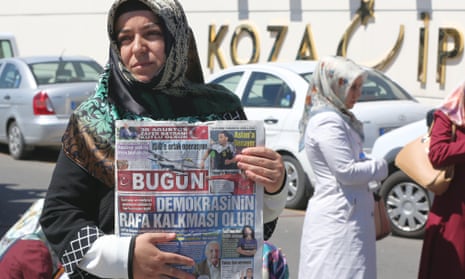Turkish police have raided the Ankara-based offices of a media group critical of President Recep Tayyip Erdoğan, a day after two British reporters were jailed on controversial terror charges.
The raids on Koza-Ipek Media sparked fresh concern about press freedom in Turkey, which is gearing for snap legislative elections in November, the second in five months.
Six people were arrested and a warrant issued for the conglomerate’s chief executive, Akin Ipek, who was thought to be in Britain, said the state-run Anatolia news agency.
The raid on Tuesday came a day after a court in Turkey’s Kurdish-dominated southeast ordered two British journalists working for US-based Vice News to be remanded in custody on terror charges.
Ipek Media Group owns the Turkish dailies Bugun and Millet, the television channels stations Bugun TV and Kanalturk, and the website BGNNews.com. It is close to Erdoğan’s political rival, the US-based Muslim cleric Fethullah Gulen.
Masked police entered 23 offices as well as Ipek University in Ankara belonging to its parent company, Koza Ipek Holding, “as part of a terrorist investigation into Fethullah Gulen”, Anatolia said.
They were accused of “providing financial support to and disseminating propaganda for a terrorist organisation”, Anatolia added.
Speaking on Kanalturk on Tuesday, Ipek denounced the operation as “baseless” and “funny”, adding: “If they [police] are able to find even a cent of illicit money I am ready to hand my company over to them.”
The move was the latest targeting supporters of the powerful Hizmet (Service) movement headed by Gulen, a former ally turned foe whom Erdoğan accuses of trying to create a “parallel state” with the aim of overthrowing his government.
Ali Haydar Konca, Turkey’s new EU affairs minister from the Pro-Kurdish Peoples’ Democratic Party (HDP), said the raids “cannot be justified”.
“I’m worried that operations targeting the media will create great concern across the world about the state of democracy in Turkey,” he added.
For several years Gulen, whose movement brings together a wide range of interests, from schools and media to finance, was seen as a close ally of Ergodan and his Islamic-rooted AKP.
But in 2013 the authorities blamed Gulen for corruption allegations that rocked Erdoğan and the ruling elite, and the government launched an all-out war against him and his supporters.
In December police arrested dozens of people in raids on other media outlets with ties to Gulen. The pro-Gulen Samanyolu TV (STV) chief Hidayet Karaca has also been remanded in custody on charges of leading a terrorist group.
As Erdoğan and his ruling Justice and Development party (AKP) prepare for elections on 1 November under the shadow of a major offensive against Kurdish militants, opposition journalists have complained of a squeeze on all critical media.
The two Vice News British reporters and their translator, an Iraqi national, have been charged by a court in the south-eastern city of Diyarbakir with “engaging in terror activity” on behalf of the Islamic State extremist group.
Vice News condemned the charges as “baseless” and “alarmingly false”, while leading rights groups have called for the immediate release of the reporters.
A senior Turkish official said the Turkish government played no role in the arrests and was “not pleased” the three were being held.
In Washington, State Department spokesman Mark Toner urged Turkey to “uphold universal democratic values”.
“That includes freedom of the press, due process and access to media information,” he said.
“We’ve made our views often and clearly to the Turkish government,” said Toner. “I’m not going to get into any specific diplomatic exchanges about this case we may have had. But they’re aware of our feelings about this.”
The EU’s foreign service expressed concern over the arrests, calling for an “independent and transparent” investigation.
Erdoğan caused outrage in the run up to 7 June elections by saying Cumhuriyet newspaper editor-in-chief Can Dundar would “pay a heavy price” over a front-page story that it said proved Turkey had sent arms to Islamist rebels in Syria.
“You can’t hide the truth even if you silence all the newspapers,” Dundar wrote on Twitter on Tuesday.
The front page of the anti-government Sozcu daily carried blank columns signed by its columnists in protest at the “unprecedented pressure on the media, the likes of which was not seen even during Turkey’s coup era”.
Meanwhile, Deniz Ulke Aribogan, an academic who hosted a TV show on state-run broadcaster TRT, said she had been fired over a tweet criticising the latest raids.
Milliyet daily recently dismissed two high-profile columnists – Kadri Gursel and Mehves Evin – after they wrote pieces critical of the government.

Comments (…)
Sign in or create your Guardian account to join the discussion